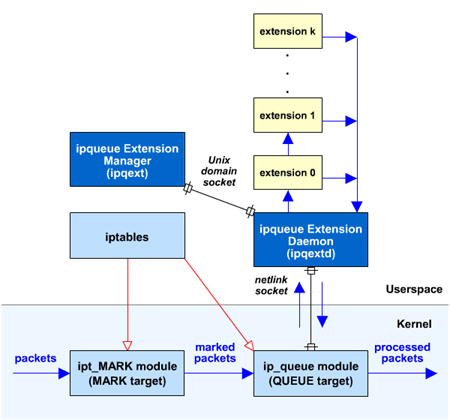What is OPERA?
OPERA stands for Open-source Project on
Extenisble Router Architecture.
Motivation
In general, hardware routers:
- support only basic routing functions
- not allow adding extra functions
- architectures are not open for user-level programming, especially
for proprietary routers
=> Lack of extensibility
With the increasing demand for quality control and security, we
need a flexible and extensible software router architecture and
an associated extension framework to integrate value-added services
into a router.
Design Goals
Throughout this project, we want to achieve:
- to link up the existing routing and packet processing facilities
on Linux with additional modules added and construct a comprehensive
software programmable router architecture
- to design a flexible architecture for transparent service support
on routers
- to simplify the deployment of services on routers
- to develop some useful applications, particularly security services,
for routers based on the architecture
The Router Architecture
Our router architecture is implemented on the Linux platform. Our
design focuses on the performance, extensibility, security and deployment.
The router architecture consists of three parts: Core, Extension
and Security.

Fig.1 Overview of the design (click to enlarge)
Core - The core part supports the basic functionalities of
a hardware router.
- Routing Engine
(#)
- supports common routing protocols, listens to and advertises route
information
- employs GNU's free routing software, Zebra, to facilitate the
route advertisements
- Packet Classifier
(#)
- classifies different packets and flows and directs packets to
further processing
- based on netfilter/iptables firewalling subsystem in the Linux
2.4.x / 2.5.x series
- Resource Kernel
(+)
- maintains an appropriate share of system resources among different
packet processing routines via resource reservation
- supports CPU reservation via Virtual Time Round Robin (VTRR) scheduling
algorithm to govern maximum allowable CPU resource for any given
extensible service
Extension - The extension part provides extra processing
capabilities to the router and eases the deployment of router services.
- Extension Framework
(*)
- built on top of the netfilter architecture
- provides a unified skeleton for router extensions
- supports both kernel and user-space extension
- achieves dynamic service loading via kernel loadable modules and
shared objects
- Kernel-space Extension
(*)
- provides hook-point based extension to insert processing routines
at multiple locations inside a kernel protocol stack
- provides an low-level and efficient packet processing framework
with low-latency for router services
- User-space Extension
(*)
- implements a user-space packet queuing and de-multiplexing mechanism,
which provides an alternative to extend router services in user-space
- provides a flexible packet processing framework for user-customized
router services
Security - The security part provides a secure control
over router communication.
- Router Authentication
(=)
- provides a scheme to verify the integrity of sensitive data and
credibility of the sender
- employs the widely-used electronic certificate and digital signature
technology
- implemented using OpenSSL toolkits
- Authentication Scheme
(#) (=)
- a common or private certificate authority (CA) to issue router
certificates
- each router has its own certificate
- sensitive data are sent with a signature attached
- sensitive data are verified with the attached signature and the
public key in certificate

Fig.2 Kernel-space extension (click to enlarge)

Fig.3 User-space extension (click to enlarge)
(#) using existing software/toolkits
(+) implemented in OPERAcore
(*) implemented in OPERAext
(=) implemented in OPERAsec
More to be added...
|